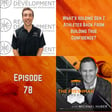
FFP82: What’s Really Holding Young Female Athletes Back?
Connect with Mike Huber
JOIN OUR COMMUNITY: https://michaelvhuber.com/newsletter
MENTAL PERFORMANCE COACHING CONSULTATION (30 minutes): https://calendly.com/michaelvhuber/mike-huber-30-minute-meeting
QUESTIONS FOR MIKE (15 minutes): https://calendly.com/michaelvhuber/the-freshman-foundation-exploratory-discussion
Timestamps & Topics
00:00 – Reintroduction to Erica: Michael welcomes his first-ever returning guest and explains why this conversation is personal.
01:20 – Why Parents Matter More Than They Think: Erica breaks down how parents can be part of the athlete’s “team”—especially with nutrition, rest, and recovery.
06:00 – The Problem with Misaligned Messaging: When coaches, parents, and specialists aren’t on the same page, the athlete suffers.
07:30 – A Smarter Way to Create Behavior Change: Erica shares how she gets buy-in from athletes and parents without pushing supplements or rules.
10:00 – Visual Learning and the Gen Z Athlete: Why showing — not telling — goes farther with today’s young athletes.
12:30 – The Long Game of Nutrition and Growth: Erica and Michael share their own experiences navigating nutrition and behavior change over years, not months.
15:30 – When the Feedback Hits Hard: Michael shares a story about his daughter’s speed limitation—and how she wasn’t ready to address it yet.
17:00 – What Proper Speed Training Really Looks Like: Erica explains how most soccer players train speed incorrectly—and what actually works.
20:15 – Why Consistency is the Secret to Progress: Like mental training, speed and strength gains come with regular effort over time—not quick fixes.
22:00 – Competing Against Yourself: Erica encourages athletes to track personal bests instead of comparing themselves to teammates.
25:00 – The Role of Decision-Making in Speed: True speed isn’t just physical—it's cognitive. Reaction time, anticipation, and awareness matter.
29:00 – What College Coaches Actually Want: It's more than just speed. Erica shares what college and club coaches look for beyond athleticism.
34:00 – ACL Injury Risk: What Can Be Done?: Erica outlines practical ways to reduce injury risk, including strength training, sprinting, and nutrition.
39:30 – The Fitness Test Trap: Obsessing over fitness tests can lead to overtraining and underperformance. Erica recommends training for the game, not the test.
42:55 – “What Should I Do as a Dad?”: Erica offers one piece of advice to Michael—and every parent—on how to support their athlete daughter the right way.



















